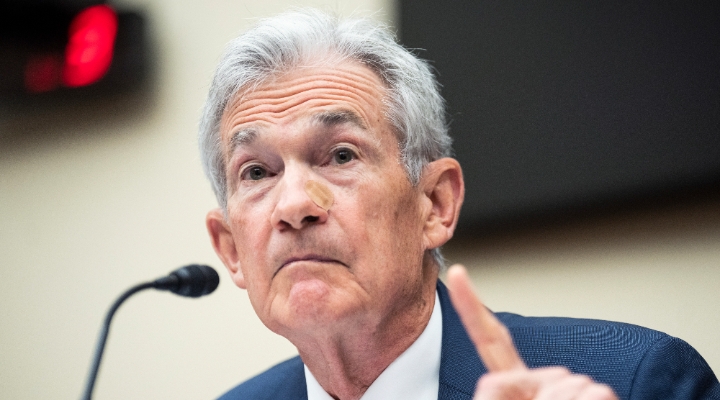
The British hawks have descended.
Last Thursday came news that wrongfooted the markets and surprised even seasoned observers of the curious no-man’s land between politics and monetary policy: we are in 50bps rate hike territory.
At the centre of the story, the numbers.
An inflation target of 2%. Inflation actually at 8.7%. And, on Wednesday, a Monetary Policy Committee vote to hike rates for a 13th consecutive time. The breakdown: seven in favour of 50bps, two in favour of no hike at all, and an apparent agreement. Another 0.25 bps hike was something nobody wanted.
But where there was clearly some agreement at the table, outside the thick stone walls of the Bank of England (BoE), there was obvious rancour at the decision to pursue a strategy that, for the most part, does not appear to be actually working.
Fed Up
At this stage, readers could be forgiven for asking why US rate hikes have somehow begun to tame inflation stateside, while, back in Blighty, progress is so much slower – if you can even call it that.
The short answer is the US can be seen as to some degree less economically vulnerable. Supply chain constraints have eased in the country and rate hikes are working. But events have also benefited the Fed's efforts.
In May, Jerome Powell admitted the demise of Silicon Valley Bank, Signature Bank and First Republic Bank had led to a tightening in credit markets, negating the need for further hikes.
This may seem a bizarre turn of events given the vulnerability caused by a banking crisis, but it’s a case study in something being bad for one group and good for another.
The result is some commentators now feel comfortable enough to argue the Fed can win its inflation fight without even tipping the US into economic recession; which is more than can be said for the UK.
It is also more than can be said for Europe as a whole, which continues its continental battle with price rises. Despite a downward trend, Germany's inflation figure surged to 6.8% in June. Surprising nobody, European Central Bank president Christine Lagarde has signalled more rate rises are on the way.
Island Nation
The UK has stuck to the rate rise trajectory too. But the narrative is now suddenly different.
Where once people speculated about the "risk" of a recession, there is now a sense it may be the only answer. But it could be a very painful answer indeed.
So as policy makers grapple with the knock-on effect of higher rates on the cost of UK debt – and, worryingly, mortgages – they are painfully aware going too far could preclude people from paying down their capital in the first place.
According to the UK Financial Conduct Authority (FCA), the outstanding value of all residential mortgage loans was £1,675.4 billion at the end of the first quarter of 2023 (2.7% higher than a year earlier). But a decrease on the previous quarter for the first time since the second quarter of 2017.
No wonder, then, that the government is already intervening.
Last week meetings between chancellor Jeremy Hunt and major retail banks produced a swift outcome: clemency for homeowners at risk of repossession, and interest-only switches for those struggling to make payments in the short term.
Other facts may reassure you. More people in the UK now own their own homes outright than have a mortgage or rent. It is an issue that must be seen in perspective. But it’s not enough to start celebrating.
What seemed to start with the massive government spending spree prompted by Covid-19, and then the cost of living crisis fuelled by a war in Europe, is now exposing the UK’s biggest economic vulnerability.
Plenty of people would have you believe it’s productivity, or even the gross domestic product problems plainly exacerbated by Brexit. But it’s housing. And people are fed up with it.
Social Rifts
There are plenty of senses in which the US is divided.
In the last eight years alone, the rise of Trumpian misinformation and scandal, culture war confrontation, and dramatic debates over guns, abortion and now trans rights has made the country often appear a tinder box to outsiders. And there have been flashovers.
But Britain has had its moments too. The Brexit referendum divided entire families, immigration debates continue to show racism is not dead, and, at one point, Boris Johnson’s government prorogued parliament to achieve short-term political aims, displaying, at best, a lazy relationship with the truth, and, at worst, contempt for the UK’s institutions and traditions his Party claimed to protect.
Despite departing office, there is still a sense things are still not well. Public services are struggling to cope with demand, no person in a frontline public sector role feels adequately paid, and rising inequality – so easily masked in the information age – is creating a society where plenty of people feel left behind. Desperate, even.
But the worst part of the UK’s malaise is more rarely on the front pages.
Our housing system is dysfunctional.
At a basic level, this is visible in the number of people experiencing some form of homelessness. The charity Crisis, which works to end homelessness in the UK, says measuring this particular problem is difficult as it is defined differently in each of the UK's constituent nations. Plenty of people experience homelessness unnoticed too.
That said, there is broad consensus that "core" homelessness – defined as rough sleeping, living in sheds, garages and other unconventional buildings, sofa surfing, hostels and unsuitable temporary accommodation – has been rising in recent years.
Quite apart from the physical and psychological strain homelessness puts on individuals, it fundamentally poses a serious risk to life. The average age of death for people experiencing homelessness is 46 for men and 42 for women.
Make no mistake, homelessness has many causes. But one of the stubborn trends feeding its existence is unaffordable housing.
Unsafe as Houses
At the moment, those getting on the property ladder by buying are getting a tough deal. And depending on what type of loan they took out to get there, those already on it will be feeling either worried for the future or exceptionally stressed.
For their part, renters pay vastly-inflated sums for landlords who often don’t care and estate agents who naively pretend they don’t know whose side they are on.
But in the end both groups are getting a terrible deal. Because whether you are renting or buying, you’re participating in a market that produces a shoddy product.
After all, the UK’s housing stock is depleted and poorly maintained. In 2017, the Grenfell Tower inferno showed what can go wrong when safety concerns are ignored.
In social housing, housing associations struggle to service demand amid rising damp and service user poverty.
In the private rented sector, participants can expect similarly-depressing failures of oversight and fairness. Private buyers rapidly join the rat race to "add value" to their homes via self-renovation, a pastime that, though lucrative, shows they are having to do the work the market never did.
Be it social housing or private estates, then, the answer is patently to build more, quickly.
But no nimby would vote for a resulting deflation in asset prices, let alone disruption to the nice view at the bottom of the garden. Aesthetically, people who do manage to get their hands on a new-build house are compromising by living in soulless ensembles of white PVC-windowed homes oftentimes riddled with shoddy workmanship.
That's not always the case, but you can barely say the UK's reputation for building good homes is brilliant and keep a straight face.
Who’s to Blame?
But back to inflation.
Monetary orthodoxy would have you believe rate rises are the key to conquering inflation because they dampen demand in the economy.
On the one hand, people supposedly get more bang for their buck from their bank accounts because the rewards for saving are greater. And on the other, people will pay more on their debt. That means less is spent, for good or ill, on the high street and at the online till.
But the BoE could justifiably be accused of naivety if it believes that, after 13 years of austerity, stagnating wage growth, and the astronomical cost of housing, Britain has enough of a savings culture for the first bit to feel noteiceable to struggling families, where both parents work just to earn enough to live. That’s without banks' own failure to pass on rate rises to customers properly.
And as for the second, people may well instinctively want to tighten their belts. But in some cases they already were. And where they can’t afford the basics, it’s the credit card or loan that will do the heavy lifting. Rising interest rates will hammer that group twice.
So what’s the missing link?
At the start of the UK’s cost of living crisis, it was the price of energy that was constantly making the headlines. As Summer temperatures rise, those headlines have gone quiet.
Today, it is the burdensome cost of food that continues to cause concerns.
According to the Office for National Statistics, "the annual inflation rates for food in March and April [2023] were the highest seen in over 45 years". Food prices have trended slightly downwards since, but they are still stubbornly high. Everyone sees that when they go to the supermarket. What's going on?
This week the Chancellor will meet regulators to investigate whether consumers are being ripped off by companies price gauging their way through inflation.
Along with the energy industry, food distributors are in the spotlight.
For its part, the British Retail Consortium – which represents retailers including supermarkets – insists its members are passing on price drops to their customers, but it’s not just the salmon counter that smells a bit fishy.
Time will tell if the accusations of opportunism are justified, but it's not just price gouging that's a potential problem. Smallification (the process whereby food manufacturers make their products smaller) also contributes to our feeling of being short-changed.
.jpg)
The Big Picture
At the moment, it’s the Bank of England taking the flack.
When he insisted in February 2022 that people shouldn't ask for pay rises, governor Andrew Bailey was accused of being out of touch. Plenty of economists would say he was correct, but it was the wrong time to say it. It made the governor an easy target of the once-more-ascendent unions.
What's more, the BoE's inflation modelling has been disastrously inaccurate. But nor has Bailey's record as former chief executive at the FCA helped, where a string of scandals led MPs to ask whether his appointment to the Bank’s top job was even appropriate. It lingers.
But it’s not just Bailey. When BoE chief economist Huw Pill said savers must accept they are now poorer, there was a unified uproar. Headline writers almost fainted. 26 years after Britain’s New Labour government handed it independence from Treasury tinkering, the BoE looks weak and exposed, and with good reason.
Conclusion
But there is every risk the Bank is the fall guy, and every risk that, in the maelstrom of navel gazing over the UK’s inflationary malaise, the big picture is immediately missed.
For one, Andrew Bailey is not directly responsible for the impact of the pandemic on the UK, which saw plenty of workers leave the workforce, and a resulting tight labour market. As a result, businesses are now competing to attract workers, which inevitably has raised wages as firms bargain to get top talent.
"We are seeing some reversal of that now but we're not back to where we were pre-Covid. That is causing our position in the labour market to be very tight," Bailey said this week.
The big picture is more than the Bank of England, then, more than short-term profiteering, if that is happening. It is more even than Boris Johnson.
Instead, it’s a messy trail of deep-rooted socio-economic problems decades in the making. It's a perfect storm that gave birth to Thatcherism, manufactured a broken housing market, hobbled the state, and, through a combination of austerity, privatisation, and mismanagement, put the public sector – and the public – under intolerable pressure.
The hawks may have descended, then, but it's not yet clear whether that will placate a prime minister desperate to halve inflation by the end of 2023, or voters faced with another round at the ballot box in 2024. At May's local elections, Sunak was handed a drubbing.
For now, the rate rises will probably continue. The only question is: at what cost?




























